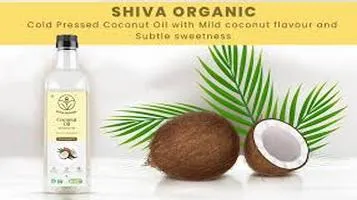Review of Coconut Oil: A Versatile and Natural Marvel
Coconut oil, derived from the meat of mature coconuts, is a versatile and popular natural product known for its myriad of uses and health benefits. It is rich in medium-chain triglycerides (MCTs), which are known to boost metabolism and provide quick energy. In the culinary world, coconut oil is prized for its high smoke point and subtle tropical flavor, making it ideal for baking, frying, and sautéing. Beyond the kitchen, it serves as a natural moisturizer for skin and hair, often included in beauty products for its hydrating properties. Coconut oil is also used in traditional medicine and alternative health practices for its potential antimicrobial and anti-inflammatory effects. Its multifaceted applications continue to make it a staple in households worldwide.

Coconut oil has been celebrated for centuries, particularly in tropical regions where coconuts are abundant. Over the past few decades, it has surged in global popularity due to its diverse applications and purported health benefits. From culinary uses to beauty treatments, coconut oil's versatility makes it a staple in many households. This review explores the various facets of coconut oil, evaluating its effectiveness, benefits, and potential drawbacks.
Culinary Uses
One of the most common uses of coconut oil is in cooking and baking. Its high smoke point (approximately 350°F or 177°C for unrefined and 400°F or 204°C for refined) makes it suitable for a variety of cooking methods, including frying, sautéing, and baking. The oil imparts a subtle, yet distinct, coconut flavor that can enhance both sweet and savory dishes. For instance, it's a popular ingredient in vegan baking as a substitute for butter due to its solid state at room temperature and creamy texture.
However, it's important to note that coconut oil is predominantly composed of saturated fats, which have been a topic of debate in the nutrition world. While some studies suggest that the medium-chain triglycerides (MCTs) in coconut oil can boost metabolism and promote fat loss, others caution against excessive consumption due to potential cardiovascular risks. Moderation, as with any other food product, is key.
Beauty and Personal Care
Coconut oil's benefits extend far beyond the kitchen. It is a revered ingredient in the beauty industry, often touted as a natural moisturizer, hair treatment, and even makeup remover. Its emollient properties make it excellent for hydrating dry skin, and it can be particularly effective for conditions like eczema and psoriasis. Many users report softer, more supple skin with regular application.
In hair care, coconut oil is celebrated for its ability to penetrate the hair shaft, reducing protein loss and preventing damage. It can be used as a deep conditioning treatment, a frizz-fighter, or even a lice remedy. Additionally, its antifungal properties make it a popular choice for treating dandruff.
For those committed to natural beauty routines, coconut oil serves as a multipurpose marvel. However, it's worth mentioning that not everyone reacts the same way to coconut oil. Some individuals with oily or acne-prone skin may find that it clogs pores and exacerbates breakouts. Patch testing before widespread use is advisable.
Health and Wellness
The health benefits of coconut oil are numerous but often contested. Proponents argue that the MCTs in coconut oil can provide a quick source of energy, improve brain function, and support weight loss. Lauric acid, another component of coconut oil, is known for its antimicrobial and antiviral properties, which can bolster the immune system.
There's also evidence suggesting that coconut oil can improve oral health through a practice known as oil pulling. Swishing a tablespoon of coconut oil in the mouth for 15-20 minutes is believed to reduce harmful bacteria, prevent cavities, and promote overall oral hygiene.
On the flip side, skeptics point out that coconut oil is high in calories and saturated fats, which can contribute to weight gain and potentially elevate cholesterol levels if consumed in large quantities. As with any health supplement, it is best to consult with a healthcare provider to determine if coconut oil is a suitable addition to one's diet.
Environmental and Ethical Considerations
Coconut oil production has environmental and ethical implications that consumers should be aware of. Unsustainable farming practices can lead to deforestation and habitat loss, particularly in biodiverse regions like Southeast Asia. Additionally, the demand for coconut oil has led to labor issues, including poor working conditions and unfair wages for coconut farmers.
When purchasing coconut oil, look for certifications such as Fair Trade and USDA Organic to ensure that the product is ethically sourced and environmentally friendly. Supporting brands that prioritize sustainable practices can make a significant difference.
Conclusion
Coconut oil is undeniably a versatile and valuable product with a wide range of applications. Its culinary uses are extensive, lending a unique flavor and beneficial properties to various dishes. In beauty and personal care, it serves as an effective natural moisturizer and hair treatment. The health benefits, while promising, should be approached with a balanced perspective, keeping in mind the ongoing debates about saturated fats.
Consumers should also consider the environmental and ethical aspects of their coconut oil purchases, opting for products that support sustainable and fair trade practices.
In summary, coconut oil is a multifaceted marvel that, when used responsibly and ethically, can offer numerous benefits. Whether you’re cooking up a storm, pampering your skin and hair, or exploring its health benefits, coconut oil is a valuable addition to any household.
Related Posts

Valentino Garavani Rockstud Shoes: A Luxurious Blend of Elegance and Edge

Review of Large Wall Murals: Transforming Spaces with Artistic Grandeur

A Comprehensive Review of the PetSafe Litter Box: Convenience Meets Innovation



